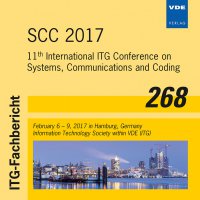Throughput Performance of Time- and Frequency-Asynchronous ALOHA
Konferenz: SCC 2017 - 11th International ITG Conference on Systems, Communications and Coding
06.02.2017 - 09.02.2017 in Hamburg, Germany
Tagungsband: SCC 2017
Seiten: 6Sprache: EnglischTyp: PDF
Persönliche VDE-Mitglieder erhalten auf diesen Artikel 10% Rabatt
Autoren:
Almonacid, Vicente (Centre Spatial Universitaire, University of Montpellier, Montpellier, France)
Franck, Laurent (D´epartement Micro-Ondes, TELECOM Bretagne, Institut Mines-Télécom, Toulouse, France)
Inhalt:
Time- and Frequency-Asynchronous Aloha (TFAA) is a random access scheme in which packet transmissions are neither coordinated in the time domain nor in the frequency domain. Its original interest lies in that it allows to reduce the transmission data rate down to levels that cannot be achieved in systems where precise channel boundaries must be respected. Consequently, the transmission power can be reduced and/or the communication range increased accordingly, which can be particularly attractive in power constrained wireless applications. Thus, TFAA can be considered as an alternative to spread spectrum communications. In this paper, we evaluate the throughput performance of TFAA over both the collision and capture channel models. For the collision channel, an exact, closed-form expression is derived, while for the capture model the exact throughput is computed through a semi-analytical approach and validated by computer simulation. In the latter case, our results show that the performance loss incurred by adding an additional degree of asynchronism is rather small. Further, TFAA can be significantly improved by the use of low-rate forward error correction. These results open new perspectives for the development of high-throughput, asynchronous random access protocols.


